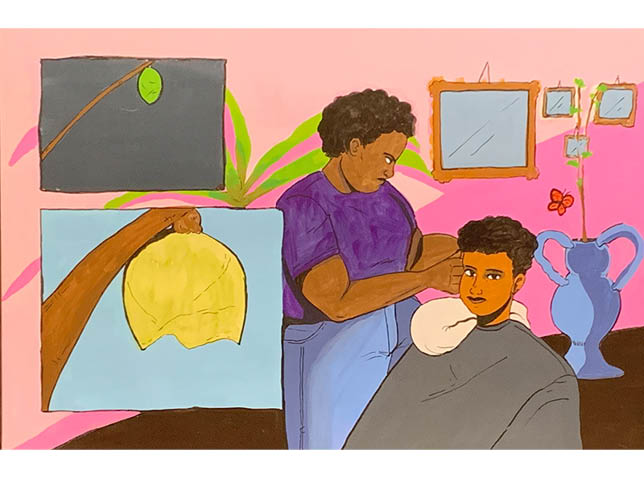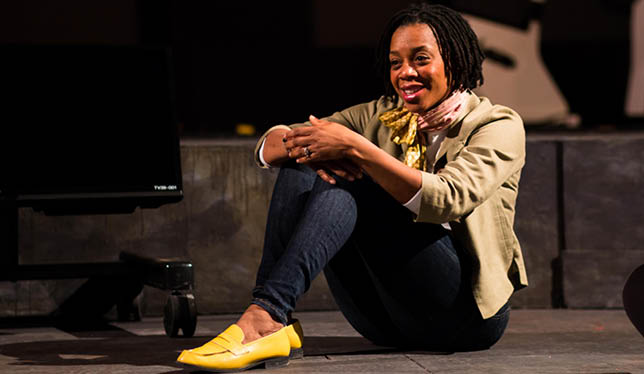Naila Keleta-Mae’s story began before she was even born. In the 1970’s, the miniseries Roots about the Trans-Atlantic slave trade entered the cultural arena, bringing with it a moment of Black awareness that spread throughout North America. About to have their second child, Dr. Keleta-Mae’s parents, Jamaican immigrants living in Canada, had picked up a copy of the Black-content magazine Ebony, which featured a list of African baby names. They chose Naila. “It translates to ‘the one who succeeds,’” she says.
“I measure my success by my capacity to use my skills to the best of my ability, in the service to my immediate family and community.”
And she has more than lived up to the promise of her name. Dr. Keleta-Mae is a prolific multidisciplinary artist, accomplished academic, author and associate professor at the University of Waterloo. She holds the Canada Research Chair in Gender and Performance, is a Dorothy Killam Fellow and serves as editor of a peer-reviewed journal and co-editor of an archive. In 2015, Dr. Keleta-Mae gained international attention for a gender and performance course focused entirely on pop megastar Beyoncé, who had recently released a self-titled album that, according to Dr. Keleta-Mae, brought the word “feminism” back into the mainstream. But it is through her research-creation project Black and Free that she can measure success by her own standard. “I measure my success by my capacity to use my skills to the best of my ability, in the service to my immediate family and community,” she says, “and success for me is that I haven’t given up on myself.”
The Black and Free project is an artistic and academic experience that deepens, enlivens, and expresses themes of blackness and freedom, projecting expansive visions of what that could represent for engaged, curious and casual members of the public. It began, by Dr. Keleta-Mae’s telling, with her childhood musings on what it meant to be Black in a family that valued blackness in a Canadian context, with a public that made assumptions about what that meant. “One of my earliest poems as a child was called Freedom, and it was about what I imagined freedom to be,” she says. “It’s also the title of my first full-length album.” The concepts of freedom and blackness are woven through her academic journey, from focusing in on Black women and playwriting in theatre during her MFA, to a PhD dissertation titled “Female and Black in Canada” that won the Mary McEwan Award for feminist scholarship. “Those are the seeds of that work that are manifesting themselves again still,” she says. “It’s been decades that I’ve been thinking about artists, artistry, scholarship and performance.”
In 2017, as Dr. Keleta-Mae was approaching a birthday milestone and reflecting on people she admired, she channeled that energy into what was then known as a Twitter rant. In 280 characters or less, she shared how she wanted to spend the rest of her life thinking about what it means to be #blackandfree. The question that emerged from that thinking, when she moved it into the academic space, is: What does Black expressive culture teach us about what it means to be Black and Free in the 21st century?
“It’s been decades that I’ve been thinking about artists, artistry, scholarship and performance.”
The research-creation project began in 2018, following the success of a pilot course that led students to examine how Black people have used performance, visual arts, theatre, music and other modes of expressive culture to imagine and advocate for freedom. Through funding from an Insight grant, her Canada Research Chair and the Ontario Research Fund Research Excellence grant, the Black and Free project allowed Dr. Keleta-Mae to visit sites that she sees as case studies of Black freedom in the 21st century. This included visiting the Jamaican hills where Black people fled and resisted enslavement to take part in an annual celebration with the Apongong and Maroon people. Last year, she went to Austin, Texas for an Afro-Tech conference that brought 20,000 predominantly African-American people together to discuss digital futures, venture capitalism and how Black people can advance in the digital era. “In order for me to think about the 21st century, it includes the historical and the future, and as much as I’m interested in the future, I can’t think about the conditions of Black peoples’ lives writ large and not be invested in the present,” says Dr. Keleta-Mae. “But it always comes back to: what can we do now?”
A lot, it would seem. Dr. Keleta-Mae has included a strong public mandate in the Black and Free project that has engaged community partners, young people, artists and groups within and outside of Canada. Last year, the project commissioned 12 Ontario-based Black artists and paid them $3,000 each to produce a work in any form of expression on the topic of Blackness and Freedom. Six of the artworks were featured in a Waterloo-based exhibit, where entrance fees were waived and transportation provided for Black and marginalized youth. The project also partnered with a local youth theatre group to offer a 12-week drama program for grade seven and eight students to explore Black theatre and performance. “We needed to have a program where the fees are waived to minimize barriers so [the students] can come and have professional theatre training – because it will change your life,” says Dr. Keleta-Mae.

When I ask her how she does it all, she says there’s no magic to it: just hard work. The day of our interview she had spent hours meticulously planning her next 18 months, to ensure Black and Free continues to meet its deliverables. On maintaining that responsibility she says, “This is literally what I imagined, and I believe in it and I’m well enough to do it.” But she’s not interested in a life of endless personal sacrifice. “That doesn’t sound like success to me. I’d like a life well-lived – I want to have other relationships and things I value outside of my artistic practice and academic work, and I’m increasingly focused on that so I can live the blackness and freedom I’m working towards.”
